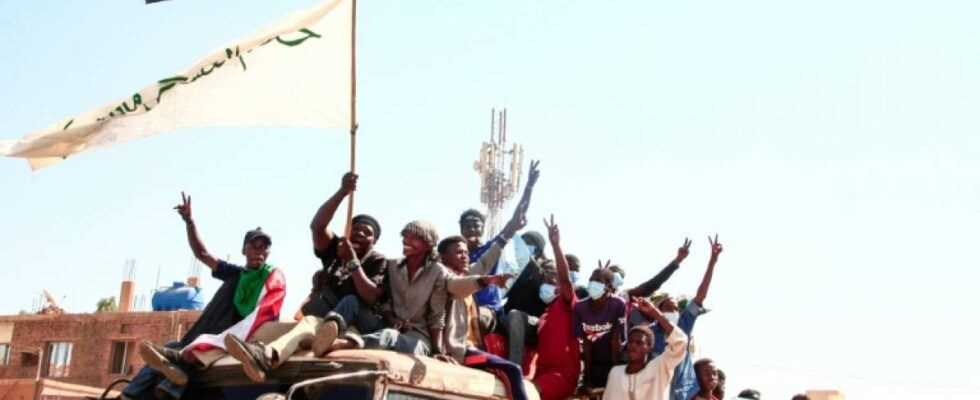Sudanese demonstrate on December 19, 2021 in Khartoum for the third anniversary of the “revolution” which overthrew dictator Omar al-Bashir and against the army, in power since his coup d’état on October 25 (AFP / -)
Sudanese police fired tear gas canisters in Khartoum on Sunday to disperse tens of thousands of demonstrators who took to the streets to oppose the army, in power since the October 25 military coup.
“The people want the fall of Burhane,” chanted the protesters in reference to General Abdel Fattah al-Burhane, who led the coup, witnesses told AFP.
These protests come three years after the start of the “revolution” in Sudan which overthrew Omar al-Bashir after 30 years of dictatorship.
After the coup and a crackdown that has since left 45 dead and hundreds injured, the spearheads of the anti-Bashir “revolution” want to revive a movement that has run out of steam among the 45 million Sudanese stuck in inflation over 300%.
On December 19, 2018, faced with the economic slump in which Bashir’s Sudan was plunged, under international embargo, hundreds of thousands of Sudanese demonstrated, forcing the army to dismiss the dictator four months later.
If the Sudanese had chosen that day, it was because in 1955, on the same date, the Parliament of the country still under British control had proclaimed independence.

Sudanese General Abdel Fattah al-Burhane, December 8, 2021 during a military exercise (AFP / Ebrahim HAMID)
Opposed to what they call the “occupation” of the military, supporters of a civilian power called for a demonstration on Sunday against the army, whose highest ranking, General Burhane, led the coup that restored the preponderance of the military.
“Today we are facing a major regression in the progress of our revolution which threatens the security, unity and stability of the country and risks leading the State into an abyss which will leave us neither homeland nor revolution”, Civilian Prime Minister Abdallah Hamdok said on Saturday.
– “Total control” of the army –
Riot police were deployed at major crossroads in Khartoum, while Sudanese authorities closed bridges connecting the center of the capital with western and northern suburbs.

Sudanese demonstrate on December 19, 2021 in Khartoum for the third anniversary of the “revolution” which overthrew dictator Omar al-Bashir and against the army, in power since his coup d’état on October 25 (AFP / -)
All the roads surrounding the army headquarters in the city center were also closed with barbed wire and concrete blocks, according to an AFP journalist.
“The coup cut the road to democratic transition: with it, the military took full control of political and economic life,” Achraf Abdelaziz, head of the independent daily “Al-Jarida”, told AFP. .

Map of the Sudanese capital Khartoum locating the presidential palace (AFP /)
Long before the putsch, Khartoum recognized that 80% of the country’s resources were still not under its control. No one knows how much of the economy is in the hands of the military, but they control many businesses ranging from poultry farming to construction.
With the putsch and the suppression of international aid in retaliation, said Mr. Abdelaziz, “the security apparatus has won out over political institutions. However, to lead a democratic transition, politics must be the driving force. “.
– Five million guns –
The army has restored Abdullah Hamdok well and promised free elections in July 2023 but has still not formed a government. Opposite, the pro-civilians, who accuse Mr. Hamdok of “treason”, are struggling to emerge politically: deeply divided before the coup, they continue to not get along.

Soldiers during a military exercise in Sudan on December 8, 2021 (AFP / Ebrahim HAMID)
For Khaled Omer, minister ousted during the putsch and part of the Forces for Freedom and Change (FLC), the civilian spearhead of the “revolution”, this putsch gives “the opportunity to correct the faults of the previous system. “. This team had rallied in 2019 under the same anti-Bashir banner civilians, soldiers and paramilitaries, joined in 2020 by rebels from remote regions of the country.
But if the sacred union fizzled out – the civilians intended to regain power on their own soon, the military imposed the extension for two years of General Burhane’s tenure as de facto head of the country – the civilians did not not yet presented an action plan, repeat the diplomats who meet them regularly.
In Sudan, where for decades conflicts have claimed hundreds of thousands of lives, the worst-case scenario could already be triggered, observers warn, with, officially according to Khartoum, five million weapons in the hands of civilians.
bur-ff / bk / hj
